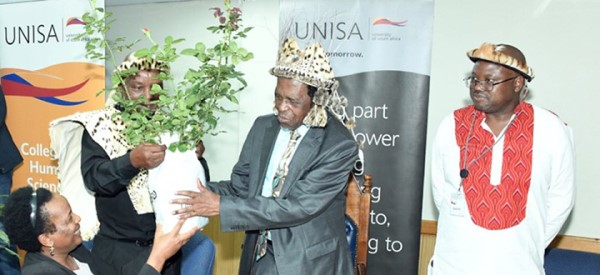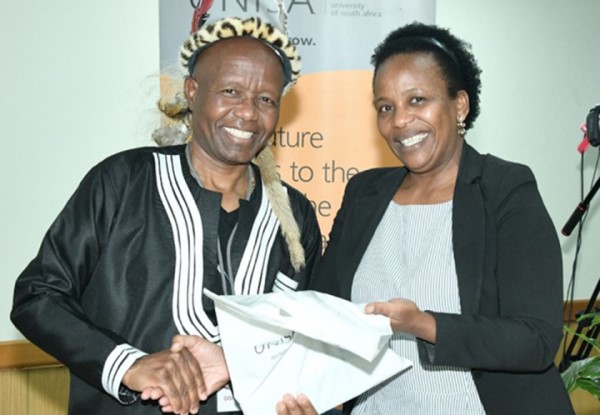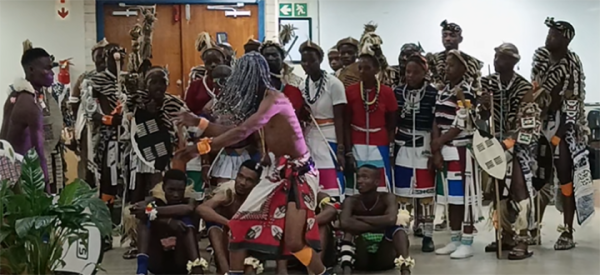
On Friday 29 November 2024, Unisa’s KwaZulu-Natal Region hosted its 5th Annual African Languages and Indigenous Knowledge Systems Seminar, focusing on the "Forgotten Language: IsiHlubi!".

Dr Joyce Myeza, Unisa KwaZulu-Natal Regional Director, presenting His Majesty King Langalibalele II, King of the AmaHlubi, with Unisa’s official rose
This seminar, which featured speakers such as historian Muziwandile Hadebe of the KwaZulu-Natal Department of Sports, Arts and Culture, delved into the history of the AmaHlubi people, shedding light on the importance of reviving and maintaining isiHlubi as an integral part of South Africa’s linguistic and cultural heritage.

Muziwandile Hadebe, keynote speaker from the KwaZulu-Natal Department of Sports, Arts and Culture with Dr Joyce Myeza, Unisa KwaZulu-Natal Regional Director
The panellists at the seminar, including Bukhosibakhe Rhadebe, Sandile Mehlomakhulu and Ndawoyakhe Hlofela of the IsiHlubi Language Board, and Khumbulani Mngadi from the University of KwaZulu-Natal Language Department, discussed these complexities in depth, offering critical insights into how the AmaHlubi are fighting to preserve their linguistic and cultural legacy.
Languages are the lifeblood of any culture, carrying with them centuries of tradition, knowledge, and identity. For indigenous African communities, their languages are not just a means of communication – they are a window into a rich history, a repository of wisdom, and a marker of belonging. As globalisation and colonial history have reshaped the African continent, many indigenous languages, like isiHlubi, have faced marginalisation and near extinction.
In an eye-opening opinion piece published by the Pretoria News on 25 October 2023, Siyabonga Hadebe raised an important question: "Why do AmaHlubi speak other people’s languages? What happened to their language – if they had one?" Hadebe's exploration of the historical erosion of isiHlubi underscores a broader issue affecting indigenous African languages. As he notes, many people who identify as AmaHlubi now speak languages such as isiZulu, isiXhosa, or Sesotho, while their own mother tongue has become largely forgotten. This linguistic shift is not merely a loss of words but a gradual erasure of a distinct cultural identity that has persisted for centuries.
The decline of isiHlubi exemplifies the painful journey many African languages have endured. For the AmaHlubi people, their language, once a vibrant expression of their heritage, is now relegated to the margins. This is not just a matter of nostalgia; it is a critical issue that has profound implications for the preservation of indigenous knowledge systems and African cultural identities.
The seminar served not only a platform to explore the legacy of isiHlubi but also as a call to action. Preserving languages like isiHlubi is essential in safeguarding the knowledge embedded within them. African languages carry unique expressions, stories, and philosophies that cannot be fully translated into any other tongue. When these languages fade, we lose the richness of their wisdom and the unique perspective they offer on African history and life.
The loss of an Indigenous language is not only a cultural tragedy but also a political one. The AmaHlubi, historically marginalised in the face of colonialism and apartheid, are now seeking recognition for their role in South Africa’s royal history. The Nhlapo Commission, established in 2010 to resolve traditional leadership disputes, has touched upon the AmaHlubi’s claims to kingship and their ongoing battle for acknowledgment. The language issue intersects with these cultural and political dynamics, as language is intrinsically tied to land, heritage, and identity.

AmaHlubi dancers in traditional dress
The preservation of Indigenous African languages is more than a matter of keeping words alive. It is about ensuring that African cultures remain vibrant, that histories are not lost, and that future generations have access to the rich, diverse knowledge systems that have been passed down through language. As the AmaHlubi fight to reclaim their language, their battle serves as a reminder to all of us: every language carries within it the heartbeat of a community, and when that language is lost, so too is a piece of humanity’s shared history.
* By Jo Cossavella, Communications Officer, Unisa KwaZulu-Natal Region, with assistance from ChatGPT
Publish date: 2025-01-20 00:00:00.0